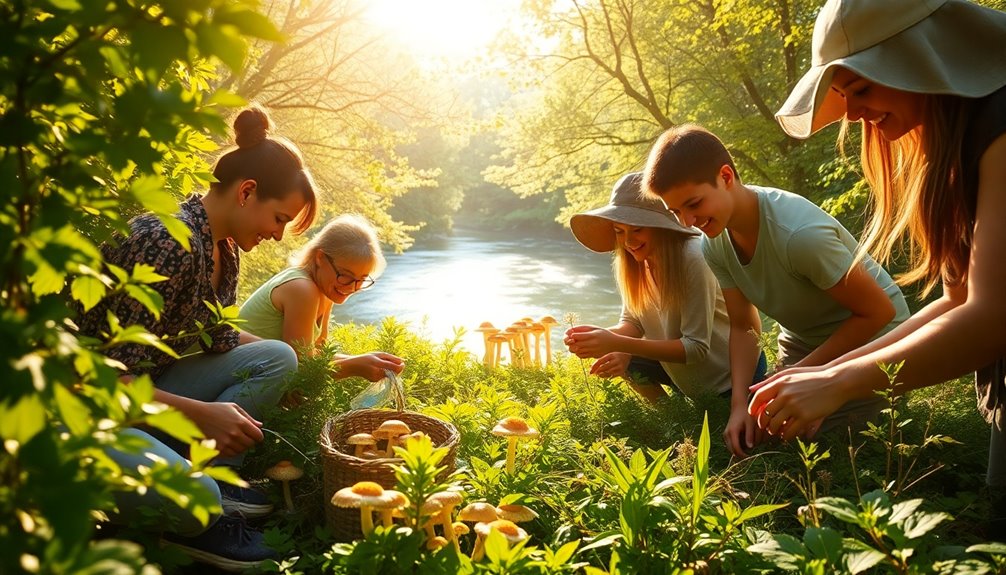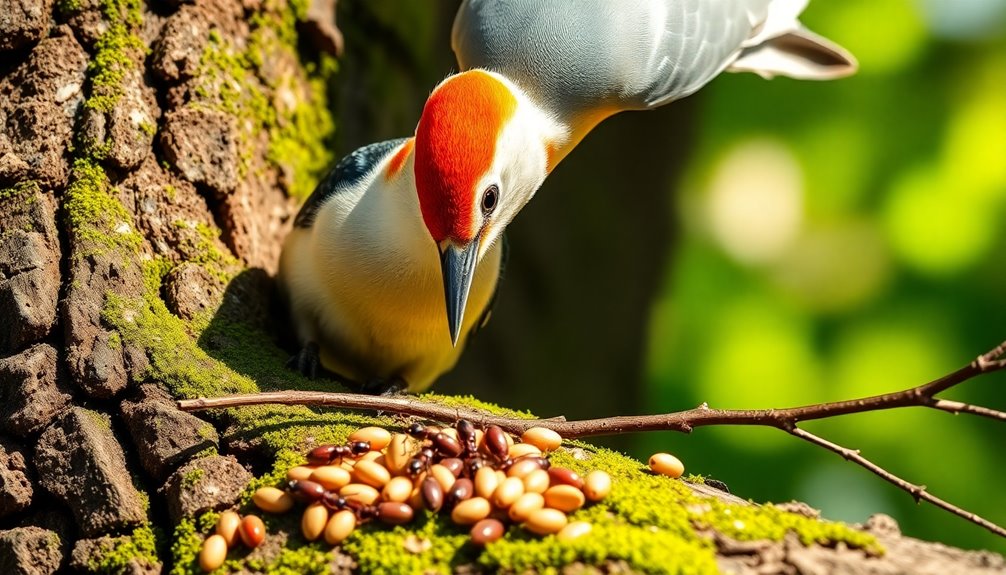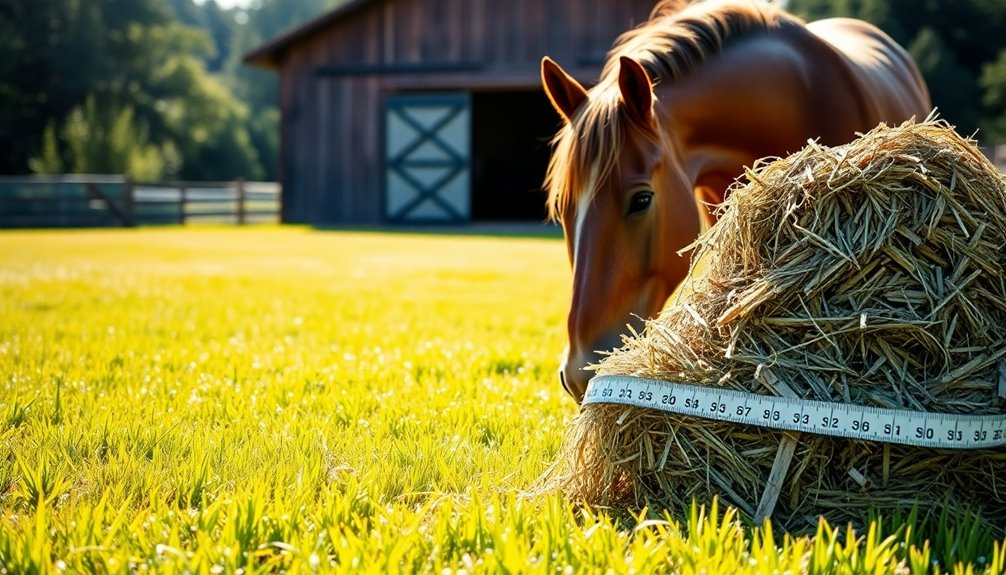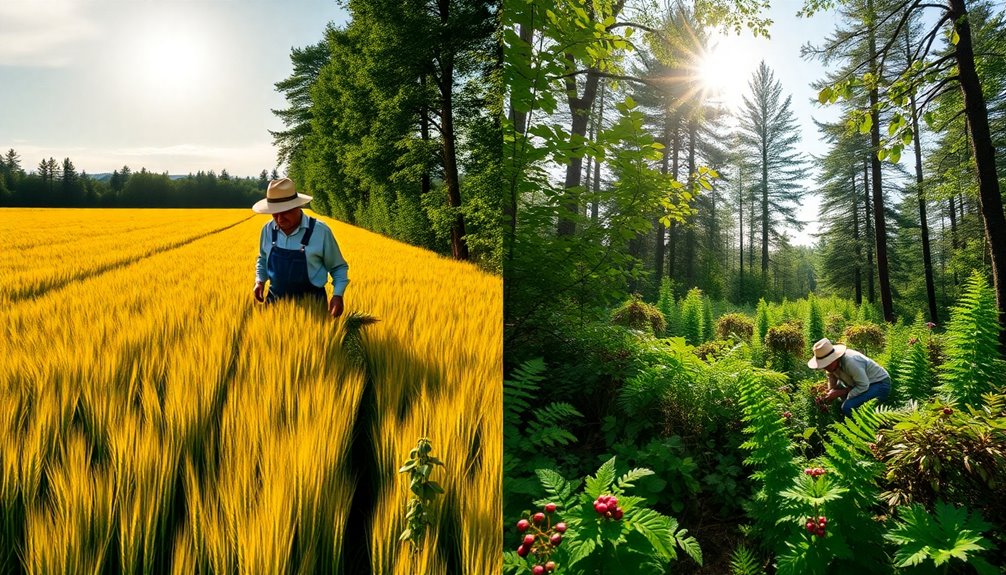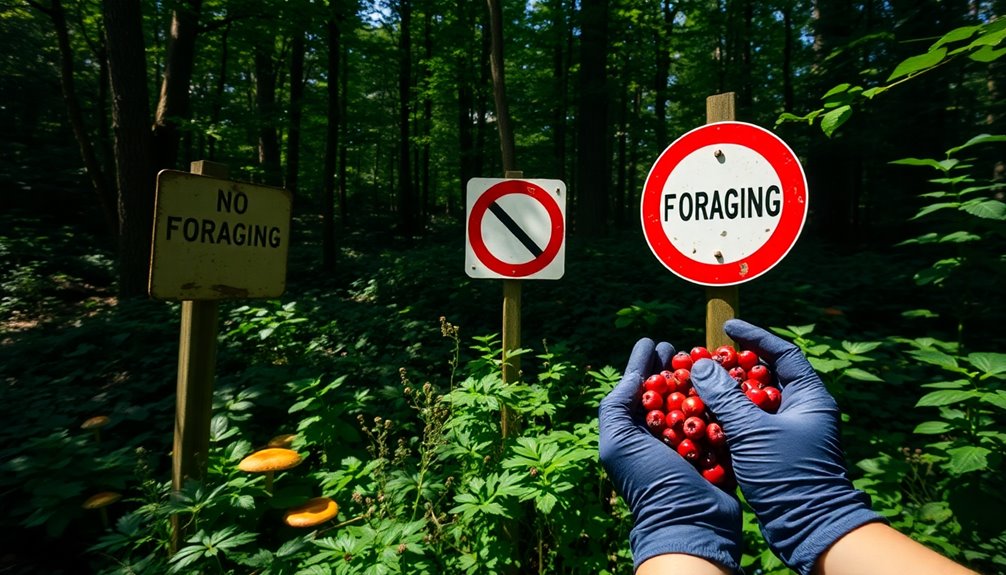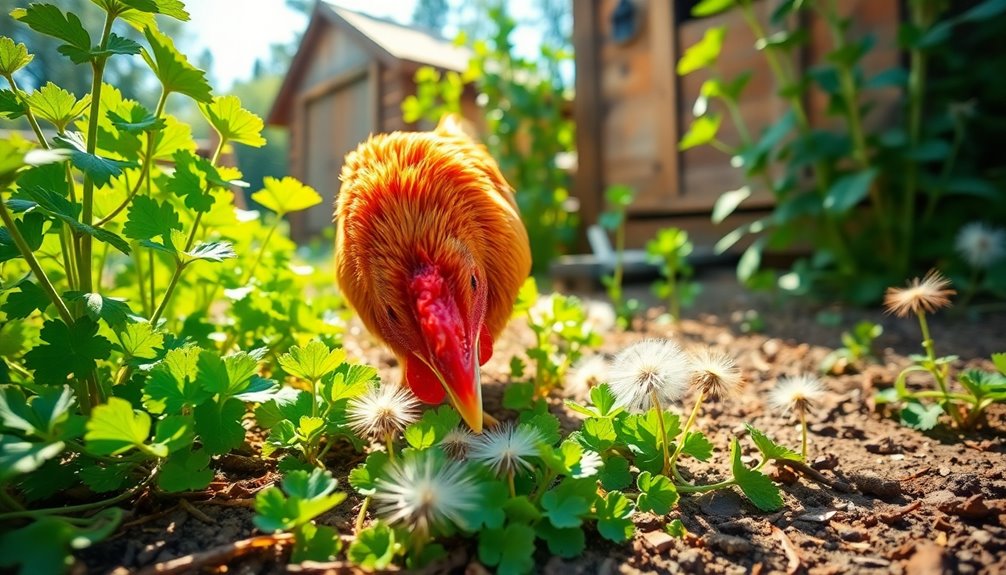Foraging is significant because it connects you with nature, culture, and community. By harvesting wild foods responsibly, you minimize your environmental impact and promote biodiversity. This practice has deep roots in many cultures, preserving traditional knowledge and strengthening community ties. Foraging also encourages healthier eating habits, offering nutrient-rich foods that support self-sufficiency. However, challenges like legal barriers and ethical concerns can complicate foraging efforts. By engaging with local ecosystems and participating in foraging events, you can contribute to sustainable practices while enriching your personal experiences—and there's so much more to uncover about its many layers.
Key Takeaways
- Foraging minimizes environmental impact, supporting ecosystem health and promoting biodiversity by encouraging the growth of native plants and wildlife habitats.
- It connects individuals to their cultural heritage, enhancing identity through traditional knowledge and practices passed down through generations.
- Foraged foods are nutrient-dense, promoting health and dietary diversity while encouraging outdoor physical activity and self-sufficiency.
- Community foraging events foster relationships, educate participants on plant identification, and enhance local economies through foraging tourism and workshops.
- Ethical and responsible foraging practices are crucial to maintaining biodiversity and ensuring sustainable use of natural resources for future generations.
Environmental Benefits of Foraging
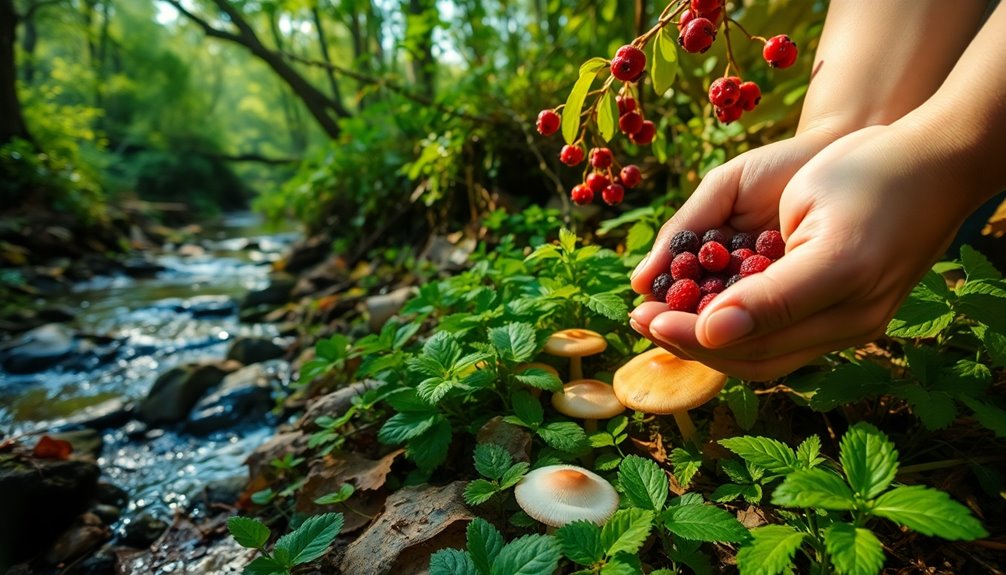
Foraging offers numerous environmental benefits, making it a sustainable choice for food sourcing. When you gather wild plants, you're minimizing environmental impact by avoiding deforestation and harmful chemicals. This practice supports ecosystem health and helps reduce your carbon footprint. By sourcing your food directly from nature, you also contribute to sustainable consumption, as foragers typically only take what they need, minimizing waste.
Moreover, wild foods generally have lower food miles compared to commercially produced items. This means less CO2 emissions from transportation and packaging, making your choices even more eco-friendly. When you engage in responsible foraging, you play an essential role in preserving biodiversity. It encourages the sustainable management of local flora and prevents over-harvesting, ensuring these resources remain available for future generations.
Additionally, foraging fosters a deeper connection with local ecosystems. You gain valuable ecological knowledge by understanding seasonal cycles and the importance of preserving natural habitats. This knowledge empowers you to become an advocate for ecological stewardship, reinforcing the idea that sustainable choices today lead to a healthier planet tomorrow. In regions like Minnesota Foraging Fun, foragers can discover a variety of wild edibles that further enhance the local ecosystem.
Cultural Significance and Heritage
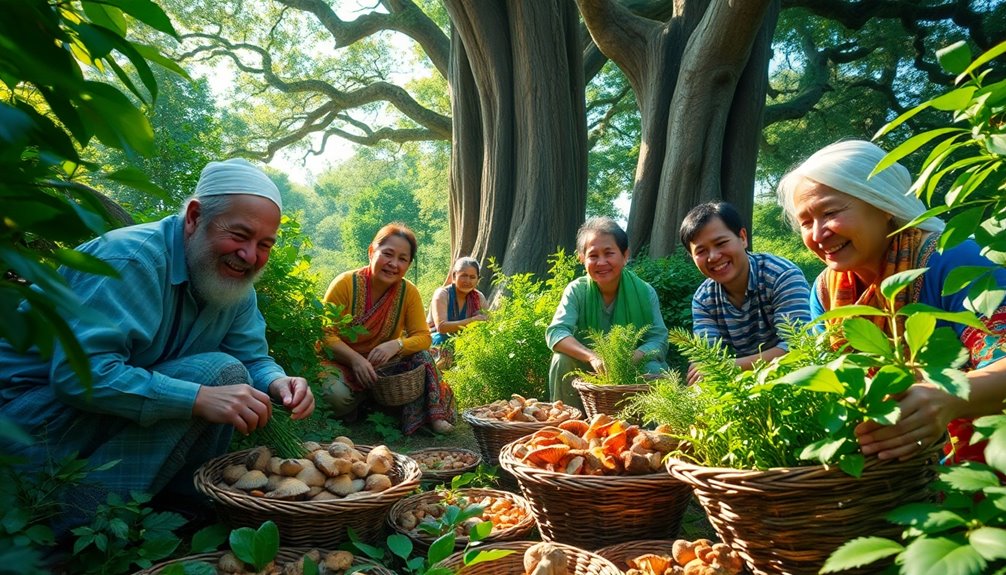
Embracing the practice of foraging connects you to a rich tapestry of cultural traditions and heritage. For many indigenous communities, foraging isn't just about food; it's a crucial part of their identity and spirituality. This extensive foraging knowledge, often passed down through generations, highlights the cultural significance of wild foods within traditional diets.
| Cultural Aspect | Description |
|---|---|
| Indigenous Practices | Integral to spiritual identity and ecological knowledge |
| Eastern European Roots | Cherished traditions connecting individuals to their heritage |
| Urban Foraging | Helps immigrants reconnect with their cultural roots |
| Community Celebrations | Festivals like the Cherokee Atohuna highlight shared heritage |
As languages fade, so too does invaluable foraging knowledge, emphasizing the need to preserve these practices. Celebrations and festivals showcase how traditional foods foster community ties, reminding us of our shared heritage. By foraging, you not only nourish your body but also honor the cultural significance embedded in these practices, ensuring they live on for future generations. Additionally, foraging practices promote sustainable farming practices, which further enrich our connection to the environment. So, grab your basket, and step into the world of foraging—your roots await!
Health Advantages of Foraging
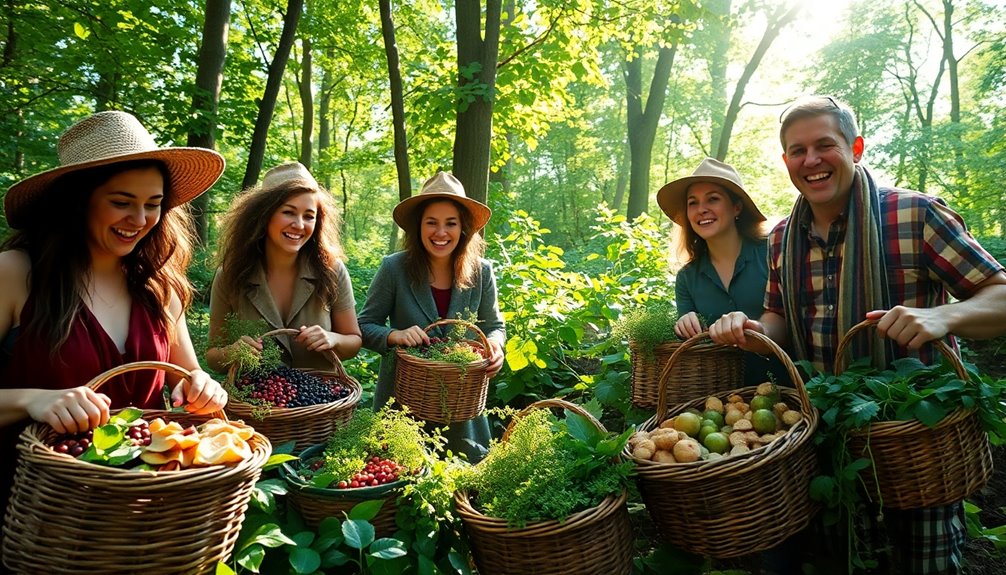
- Access to free, nutrient-dense foods: Wild edibles are often richer in vitamins and minerals than their store-bought counterparts. Chia seeds, for instance, are a rich source of omega-3 fatty acids, which are essential for heart health.
- Improved dietary diversity: Foraging introduces you to new flavors and nutrients, enhancing your overall nutrition. The consumption of diverse wild foods has historical significance, as many ancient cultures relied on various seeds, including chia, for sustenance.
- Physical activity: Engaging in foraging encourages outdoor movement, promoting better fitness and health.
- Mental well-being: Spending time in nature reduces stress and anxiety, leading to improved mood.
- Self-sufficiency: Learning about local food sources empowers you to take control of your diet and health.
- Enhanced gut health: Foraged foods, like chia seeds, can provide dietary fiber that supports digestion and regularity.
Challenges and Sustainability Concerns
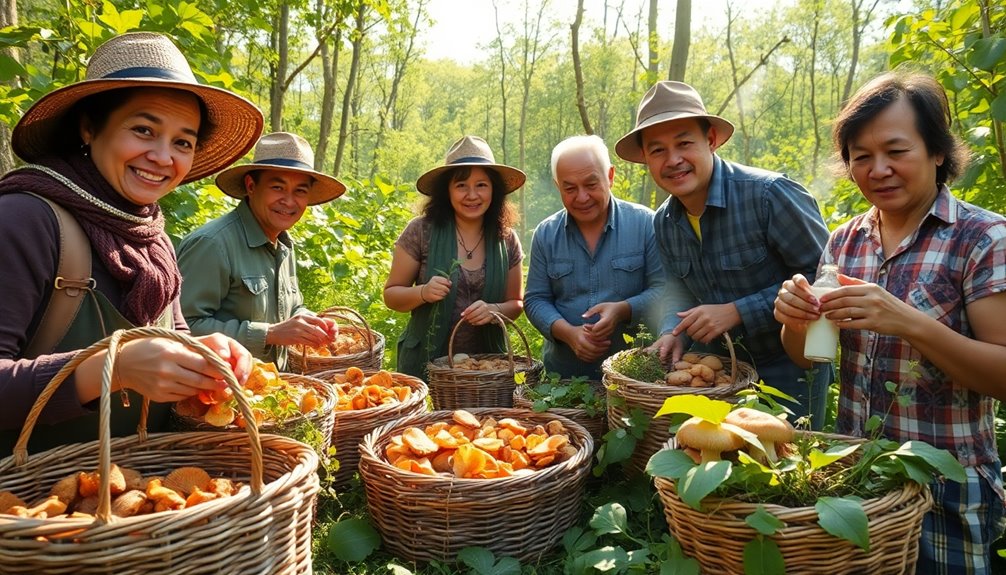
When you forage, it's essential to be aware of the risks of over-harvesting, as it can threaten local plant species and disrupt ecosystems. Legal barriers can complicate your foraging efforts, making it important to know your rights and the regulations in your area. Plus, without proper knowledge of plant identification, you might face health risks from misidentifying edible species, underscoring the need for education in safe foraging practices. Additionally, understanding the foraging range of local wildlife can help you avoid areas heavily impacted by resource depletion.
Over-harvesting Risks
Over-harvesting poses significant risks to local ecosystems, threatening plant populations and disrupting the delicate balance of biodiversity. When you forage, it's vital to be aware of the potential consequences of your actions.
Over-picking can lead to biodiversity loss and raise ethical concerns regarding the health of the ecosystem.
Here are some key points to keep in mind:
- Sensitive plant species are particularly vulnerable to over-harvesting.
- Ethical concerns arise when harvesting impacts other flora and fauna in the area.
- While many species are abundant, responsible foraging guarantees harvesting aligns with natural regeneration rates.
- Systematic harvesting usually maintains future yields, but over-harvesting immature fungi can be detrimental.
- Understanding and adhering to local foraging laws is important to prevent ecological harm.
- Engaging in community building can help promote sustainable foraging practices and protect local ecosystems.
Legal Barriers
Many urban foragers encounter significant legal barriers that complicate their efforts to gather wild foods. These barriers can include restrictions on where foraging is allowed, which often limits access to prime foraging spots. The concern about liability for foraged products further discourages individuals from participating. With unclear regulations, you may find it challenging to know if you're foraging legally.
| Legal Barriers | Impact on Urban Foraging | Conservation Efforts |
|---|---|---|
| Restricted areas | Limits access to resources | Protects ecosystems |
| Liability fears | Deters community engagement | Encourages responsible use |
| Lack of regulations | Creates confusion | Hinders supportive policies |
| Health risks | Risks from misidentification | Necessitates education |
These factors not only affect your ability to forage but also pose health risks associated with misidentified plants. Additionally, without documented evidence of foraging's ecological effects, balancing foraging rights and conservation efforts becomes difficult. Addressing these legal barriers is essential for fostering a sustainable urban foraging culture that respects both community needs and the environment.
Health Concerns
Maneuvering the urban foraging landscape brings significant health concerns that can't be overlooked.
When you venture into foraging, understanding the risks associated with misidentifying edible species is vital. Poisoning is a real threat, and that's why proper education on plant identification and safe foraging practices is essential.
Here are some key health concerns to keep in mind:
- Misidentifying plants can lead to toxic reactions.
- Legal barriers may create uncertainty about safe foraging locations.
- Lack of research on environmental impacts raises sustainability doubts.
- Overharvesting can threaten local species and ecosystems.
- Community engagement is necessary for spreading awareness and knowledge.
Community Engagement and Education

Foraging not only connects you to nature but also fosters strong relationships within your community. By participating in foraging events, you engage with others who share a passion for identifying edible plants and practicing responsible harvesting. This shared knowledge builds community support and safety, especially essential during challenging times like the COVID-19 pandemic, when foraging networks provided both food and mental health benefits. Additionally, increased security protocols during community foraging events ensure that participants feel safe and secure while exploring natural environments. Engaging with nature through foraging can also help alleviate symptoms of anxiety and depression, enhancing overall emotional well-being. Moreover, these activities promote nutritional balance by encouraging the incorporation of diverse, foraged foods into your diet.
Through the educational aspects of foraging workshops and guided tours, you deepen your understanding of local flora and ecosystems. This knowledge promotes sustainable practices and enhances biodiversity awareness, significant for ecological preservation. Cultural exchange during these events combats plant blindness, helping you appreciate diverse foraging traditions. Additionally, learning about sustainable practices ensures that the benefits of foraging extend beyond individual gain to support environmental health.
| Foraging Event Type | Community Benefit | Educational Aspect |
|---|---|---|
| Workshops | Builds connections and support | Teaches identification skills |
| Guided Tours | Enhances safety in foraging | Increases awareness of ecosystems |
| Community Gatherings | Strengthens solidarity and resilience | Shares traditional ecological knowledge |
Engaging in these activities guarantees that sustainable practices are not only learned but also passed down to future generations, enriching your community's connection to nature.
Urban Foraging Trends

Urban foraging trends are reshaping how you connect with your community and heritage, offering a chance to source food sustainably. As you explore your surroundings for edible plants, you're not just finding free, nutritious options; you're also engaging in a rich cultural exchange. Additionally, understanding safety guidelines for urban foraging can help you enjoy this practice while minimizing health risks. Engaging in foraging can also promote environmental awareness, as it encourages individuals to appreciate and protect natural resources. However, traversing the challenges of legality and safety can complicate this rewarding practice.
Community Engagement Benefits
A growing movement in cities is connecting people through the shared experience of foraging. Urban foraging fosters community engagement by bringing together individuals from diverse backgrounds, all while promoting sustainable food practices.
It's not just about gathering food; it's also about sharing knowledge and stories that enrich our understanding of the environment.
Here are some key benefits of community engagement through urban foraging:
- Nutrient-rich foods: Foraging provides free access to healthy ingredients, particularly aiding low-income communities.
- Environmental stewardship: By participating in foraging, you contribute to preserving urban biodiversity and sustainability efforts.
- Knowledge exchange: Foraging events facilitate storytelling and transfer of skills across generations, strengthening community bonds.
- Safety and ethics: Organized groups share essential information about plant identification and responsible gathering practices.
- Cultural connection: Engaging in foraging helps you connect with local ecosystems, enhancing your cultural identity.
Through these shared experiences, urban foraging cultivates a sense of belonging and encourages a healthier, more sustainable lifestyle for everyone involved.
Cultural Heritage Connection
Connecting with cultural heritage through foraging offers a unique lens into the food-gathering practices of diverse communities. For many immigrants, urban foraging serves as a powerful way to reconnect with their roots, reflecting traditional ecological knowledge passed down through generations.
You'll find that this practice not only strengthens cultural identity but also facilitates storytelling, helping to share essential information about local ecosystems and biodiversity.
Urban foraging allows you to access culturally relevant foods that mightn't be available in mainstream grocery stores, enhancing food systems and contributing to food security within your community. As you gather food, you engage in a shared experience that fosters intercultural relations, bringing people together from various backgrounds.
Moreover, the act of foraging promotes environmental stewardship and social interaction, as you appreciate the cultural significance of local ecosystems.
Sustainability Challenges Faced
Maneuvering the sustainability challenges of urban foraging requires careful consideration of its impact on local ecosystems. As you explore foraging in urban settings, it's essential to be aware of the potential consequences, including bio-diversity loss and overharvesting.
Here are some key considerations:
- Legal Barriers: Many urban areas restrict where foraging is allowed, complicating your search for edible plants.
- Health Risks: Misidentifying plants can lead to poisoning, highlighting the need for proper education on safe foraging practices.
- Market Pressures: The growing demand for wild foods can result in over-exploitation of certain species, jeopardizing their sustainability.
- Ecological Impact Uncertainty: There's a lack of documented evidence on the negative ecological effects of foraging, making it hard to assess its long-term viability.
- Community Engagement: Working with local groups can help advocate for responsible foraging practices and educate others on sustainable methods.
Ethical Foraging Practices
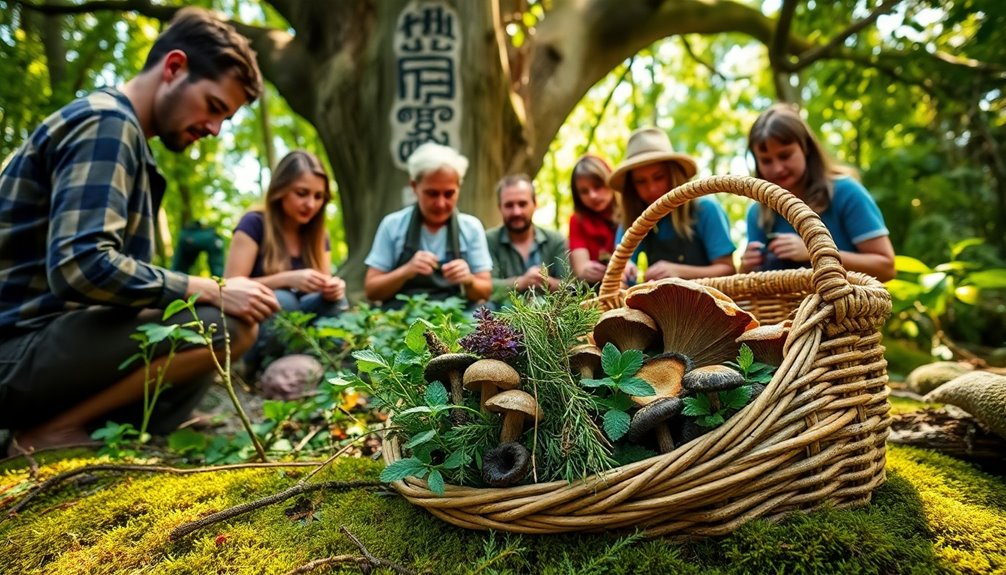
Ethical foraging practices play an essential role in preserving our natural ecosystems while allowing you to enjoy the bounty of the wild. By emphasizing sustainable harvesting methods, you can guarantee that you take no more than 10% of a plant population and that you only harvest from abundant, non-threatened species. This approach helps maintain biodiversity and supports the health of local ecosystems.
You'll want to educate yourself about the seasonal availability of wild foods and focus on harvesting mature plants and fungi. This guarantees their continued growth and reproduction. Responsible foragers also advocate for leaving enough seeds and roots in the ground after harvesting, promoting regeneration and giving back to the environment.
It's vital to be aware of local laws and regulations regarding foraging. Some areas have restrictions to protect sensitive habitats and species, guaranteeing your foraging activities remain legal and sustainable.
Joining foraging communities and utilizing recommended resources can deepen your understanding of ethical practices, fostering a culture of stewardship and respect for nature. By adopting these strategies, you not only enhance your foraging experience but also contribute positively to the environment.
Frequently Asked Questions
Why Is Foraging Important for the Environment?
Foraging's important for the environment because it directly supports ecosystem health.
When you gather wild foods, you minimize the need for harmful agricultural practices like deforestation and chemical use. By embracing responsible foraging, you help maintain biodiversity and promote soil health.
Additionally, you can combat invasive species by focusing on native plants, enhancing local wildlife habitats. Engaging in foraging fosters a deeper connection to nature, encouraging you to practice stewardship within your community.
What Is the Significance of Foraging?
Foraging's charm lies in its ability to connect you with nature's bounty and wisdom.
It's not just about gathering food; it's an enriching experience that fosters a deeper appreciation for your local ecosystem.
You'll discover seasonal delights, enhance your well-being through outdoor activity, and even strengthen your community ties.
Engaging in this time-honored practice, you're not only nourishing your body but also nurturing your spirit and cultural roots.
How Does Forage Affect the Environment?
Foraging affects the environment positively by minimizing your carbon footprint. When you gather wild food, you avoid the transportation and production emissions linked to store-bought items.
Responsible foraging supports ecosystem health, encouraging biodiversity and soil health. You'll also be engaging with abundant species, reducing the risk of over-harvesting.
Why Is Foraging Important for Survival?
Imagine wandering through a lush forest, vibrant greens surrounding you as you search for edible treasures.
Foraging's important for your survival because it connects you to nature's bounty. By identifying and gathering wild plants, you're accessing nutrient-rich foods that can boost your health.
This practice not only fills your stomach but also enhances your knowledge about the ecosystem. It's a skill that empowers you to thrive, especially in uncertain times.
Conclusion
In the grand scheme of things, foraging isn't just about gathering food; it's a powerful thread weaving together culture, health, and the environment. By embracing this practice, you're not only nourishing yourself but also connecting with nature and your heritage. As you step into this world, remember to tread lightly and respect the land. With a little effort, you can reap the rewards of foraging while ensuring it thrives for future generations. So, let's get out there and forage!

